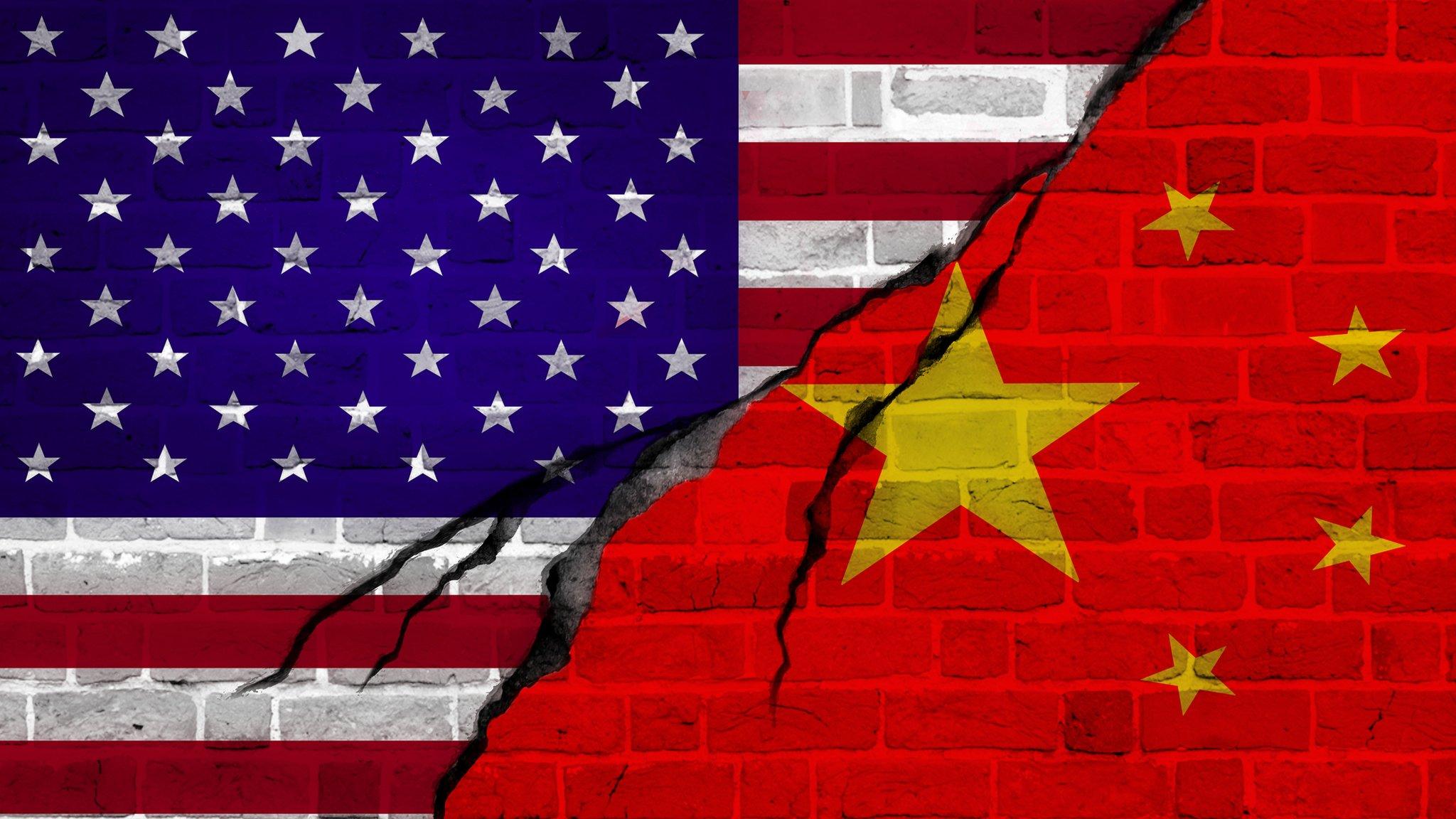Trump Nato: New war of words with Merkel
- Published
In 2018, Donald Trump told Nato chief Jens Stoltenberg that Germany is "totally controlled by Russia"
US President Donald Trump has clashed with German Chancellor Angela Merkel over Russian influence and defence spending, ahead of a Nato summit.
Mr Trump said Germany was "totally controlled by Russia" because of the high level of natural gas it imported, and this was a "bad thing for Nato".
Mrs Merkel hit back, comparing German independence now with the time when she grew up in the former East Germany.
She also defended her country's contribution to the Western alliance.
The last summit both leaders attended ended in acrimony in a row over trade. Mr Trump later made more conciliatory remarks after he and Mrs Merkel had met on the sidelines of the summit in Brussels on Wednesday.
The summit comes less than a week before Mr Trump is due to hold his first summit with Vladimir Putin, in Helsinki, reviving concerns among US allies over his proximity to the Russian president.
President Trump shocked some by quipping that the Nato summit might prove harder than next Monday's summit with Mr Putin.
He has said the US is being "taken advantage of" by other members of the Nato alliance, which was set up in 1949 to counter the Soviet Union, of which Russia is the main successor state.
European Council President Donald Tusk accused him of criticising Europe "almost daily", tweeting: "Dear America, appreciate your allies, after all you don't have that many."
What exactly did Trump say about Germany?
Germany has the EU's biggest economy and has long been accused by US administrations of failing to contribute its fair share to Nato operations but Mr Trump's comments were particularly stinging.
At a breakfast meeting in Brussels with Nato chief Jens Stoltenberg, the US leader said: "Germany is totally controlled by Russia because they will be getting from 60% to 70% of their energy from Russia, and a new pipeline, and you tell me if that's appropriate because I think it's not and I think it's a very bad thing for Nato."
EU figures suggest Russia is responsible for between 50% and 75% of Germany's gas imports, external, but gas makes up less than 20% of Germany's energy mix for power production.
Germany has given political support for a new Baltic Sea pipeline, Nord Stream 2, which will increase the flow of Russian gas to EU states. The project has been sharply criticised by Poland and others.
The US president also accused Germany of only spending "a little bit over 1%" of its economic output on defence compared to the 4.2% spent by the US "in actual numbers".
Germany spends 1.24% of GDP on defence and the US 3.5%, external, according to the latest Nato estimate.
How did Merkel respond?
"I want to say that I have experience of when a part of Germany was controlled by the Soviet Union," she told reporters.
"I am very happy that today we are united in freedom as the Federal Republic of Germany. Because of that we can say that we can make our independent policies and make independent decisions.
"That is very good, especially for people in eastern Germany."
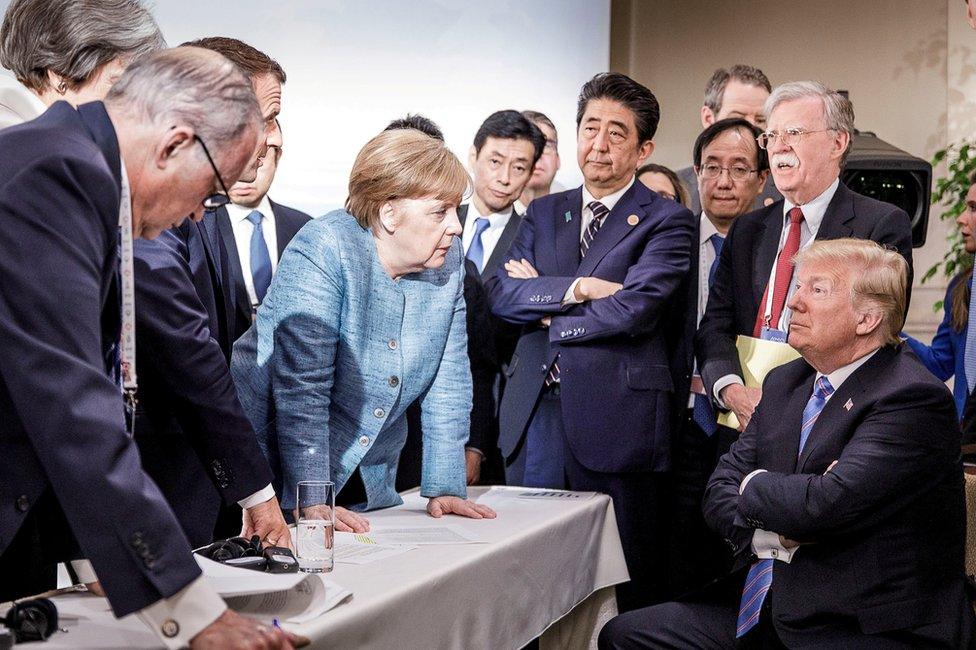
Mrs Merkel (centre) led efforts to negotiate with Mr Trump over trade at last month's G7 summit in Canada
She added that Germany had put a huge proportion of its troops at Nato's disposal.
"We are still very heavily involved in Afghanistan and thus we also defend the interests of the United States of America... and Germany was pleased to do it and did it out of conviction," she said.
At the G7 summit in Canada last month, the German chancellor led efforts to reach agreement with Mr Trump on trade but the American leader rejected the G7 summit joint communique after he left.
Mr Stoltenberg sought to play down Mr Trump's accusations, saying he expected Nato leaders would agree they were "stronger together than apart".
He also tried to separate arguments about trade - not a primary Nato concern - from discussions about military matters.
"There are disagreements on trade. This is serious. My task is to try to minimise the negative impact on Nato," Mr Stoltenberg told a forum on the sidelines of the summit.
And what did the leaders say after their meeting?
Mr Trump told reporters that military spending and a planned gas pipeline from Russia to Germany had been discussed.
"We have a very, very good relationship with the chancellor. We have a tremendous relationship with Germany," he said.
Mrs Merkel said she had discussed migration and trade with Mr Trump, and that she looked forward to further discussions as the US and Germany remained partners.

Moscow's potential influence
By Jonathan Marcus, BBC defence and diplomatic correspondent
In describing Germany as being "totally controlled by Russia" and linking this to what the US sees as Berlin's unsatisfactory defence budget, President Trump is underscoring two longstanding US concerns.
US leaders have long warned of what they see as Europe's uncomfortable dependence upon Russian energy supplies. And they have also been arguing for more than a decade that the Europeans should spend more on defence. Mr Trump has given these twin themes a new and more abrasive tone.
While he may well be overstating Germany's dependence upon Russian energy, even many European leaders are well aware of the potential influence that this could give Moscow. It's an area where short-term economic and longer-term security considerations are at variance.
No wonder then that when the US sanctions Russia for its behaviour in Ukraine and its annexation of Crimea it included steps to hamper anyone who helped build or support new Russian pipelines westwards.

What is the spending row about?
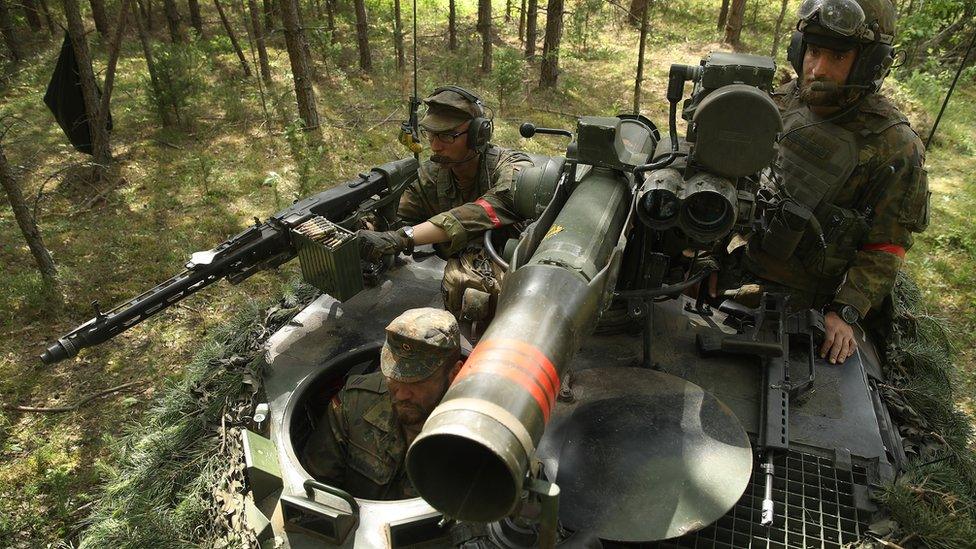
German troops in Lithuania this summer
Mr Trump's main objection is that all but a handful of member states have still not increased their defence budgets to meet a goal of spending at least 2% of their annual economic output on defence by 2024.
Allow X content?
This article contains content provided by X. We ask for your permission before anything is loaded, as they may be using cookies and other technologies. You may want to read X’s cookie policy, external and privacy policy, external before accepting. To view this content choose ‘accept and continue’.
Of Nato's 29 members, just five meet that target this year: the US, Greece, Estonia, the UK and Latvia. However, several, such as Poland and France, are close to the mark.
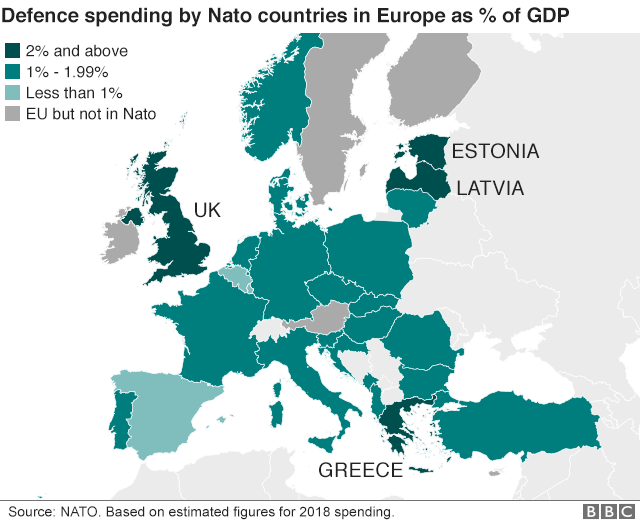

Some in Nato fear Mr Trump's repeated blunt demands could harm morale, furthering the agenda of President Putin, whom they accuse of seeking to destabilise the West.
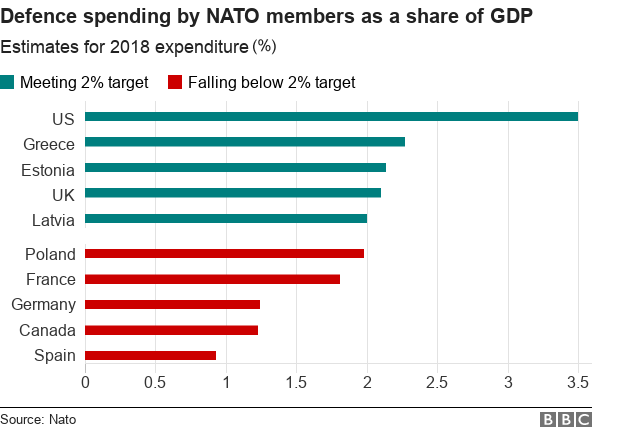
After the Nato summit on Wednesday, President Trump will spend four days in the UK before his summit with the Russian leader.
- Published11 July 2018
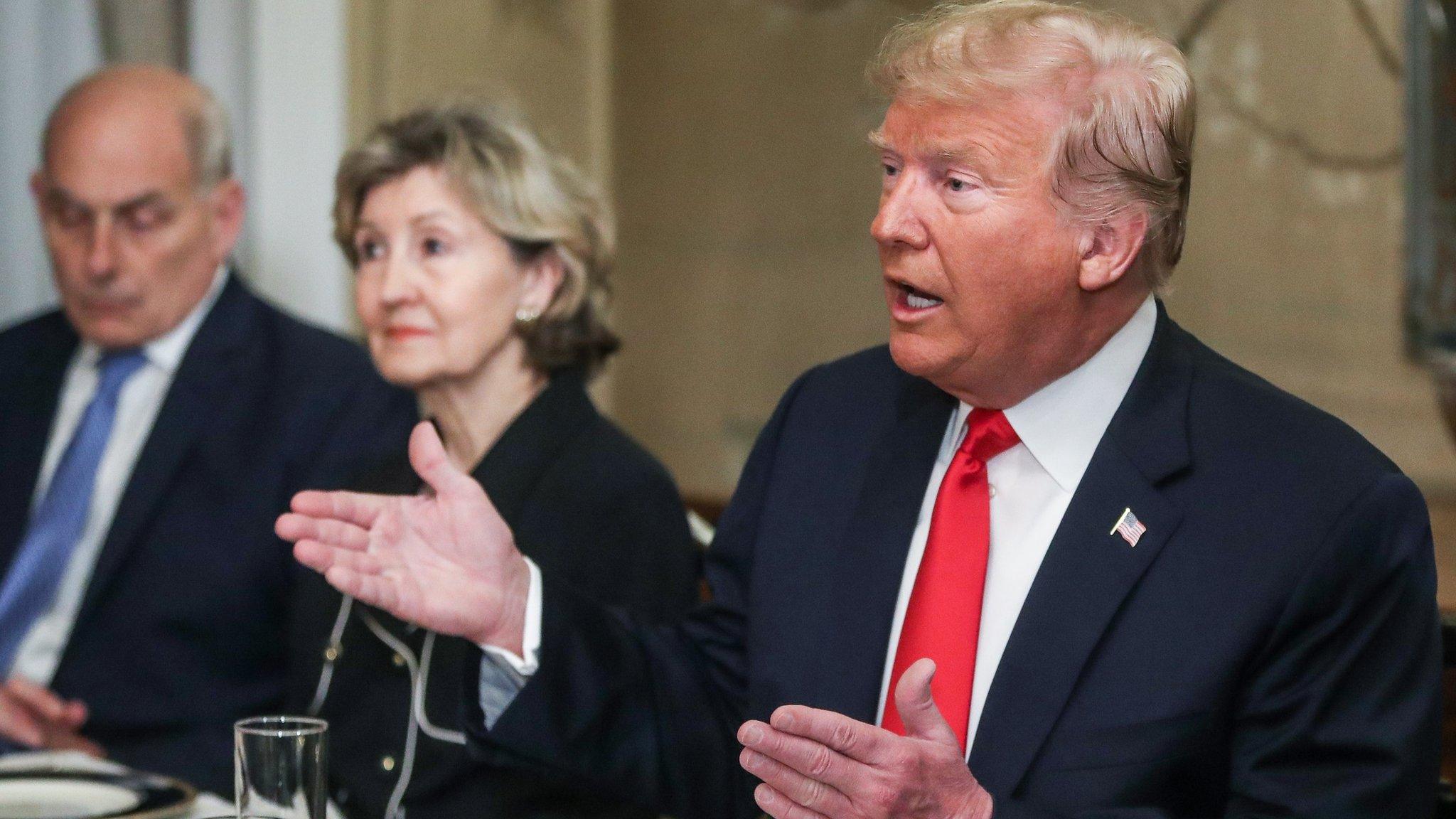
- Published10 July 2018
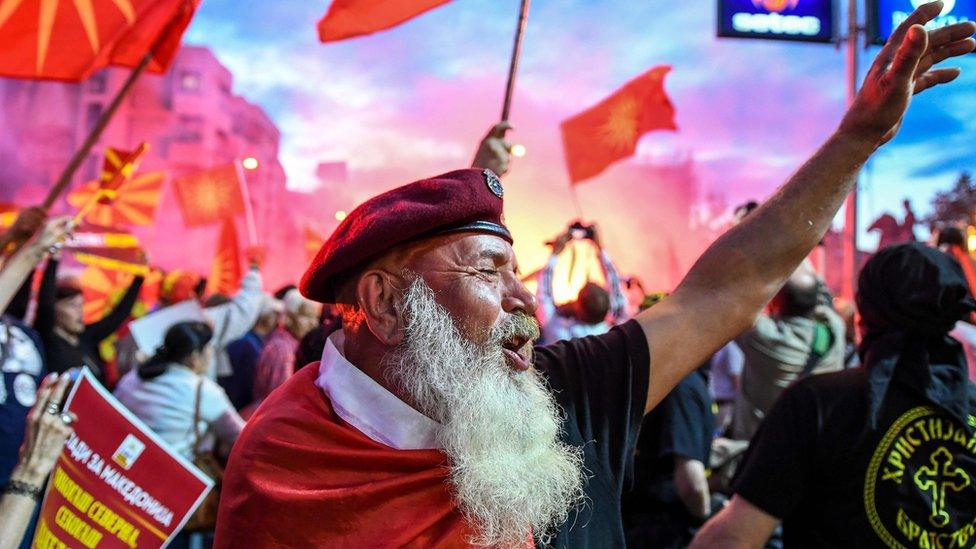
- Published10 May 2019
